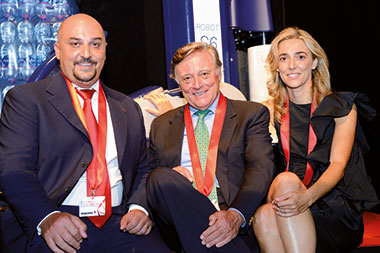Aetna: the optimism of reason
The contribution of young people; the enterprise as a shared asset; the meaning of internationalization; the orientation of innovation... Reflections of Alfredo Aureli, president of Aetna Group, in an interview at Interpack, in which the entrepreneur explains why it’s reasonable to be optimistic.
 Some might say it’s easy to be optimistic, in spite of many crises slowing the recovery, when one is at the helm of a large, globalized and well-established group. So might say those who suffer from chronic sea-sickness over the economy’s violent ups and downs. But in reality, the opposite is true, because “thinking positive” can prove difficult when one is responsible for a large and complex enterprise that is tested every day on different markets, each with its own logic, and each constantly subject to change.And so it was an interesting talk with the president of the Aetna group, Alfredo Aureli - at Interpack together with his son and daughter Enrico and Valentina (today managing director and vice-president as well as managing director, respectively), because he places so much faith in the future, that of his own concern first and foremost, but not only.
Some might say it’s easy to be optimistic, in spite of many crises slowing the recovery, when one is at the helm of a large, globalized and well-established group. So might say those who suffer from chronic sea-sickness over the economy’s violent ups and downs. But in reality, the opposite is true, because “thinking positive” can prove difficult when one is responsible for a large and complex enterprise that is tested every day on different markets, each with its own logic, and each constantly subject to change.And so it was an interesting talk with the president of the Aetna group, Alfredo Aureli - at Interpack together with his son and daughter Enrico and Valentina (today managing director and vice-president as well as managing director, respectively), because he places so much faith in the future, that of his own concern first and foremost, but not only.
How is Aetna Group doing following the generational change in management?
It’s doing well, both in terms of merit (my successors are good at what they do) and of luck... and a little luck is always needed. All entrepreneurs dream of passing on the business to their children, to be sure, but continuity of leadership cannot be imposed. Let’s say it requires at least two conditions: the first is that the new generations are given proper education and are capable of bringing competence and vision to the concern, not just the owner’s last name.
And the second?
The second is that the previous generations manage to guarantee respect for the values in which they believe, and that, given time, they know how to step aside, as my father did with me.
In your story however, there is a factor which is difficult to replicate: that sense of urgency that drove the entrepreneurs of the immediate postwar period.
I would say that, albeit in a different way, that urgency is also with us today, due to this long crisis, globalization, the confrontation with the different logics of emerging competitors... new factors and new obstacles that can be highly motivating. Without counting how today, compared to the past, we have access to much more information, and that constitutes an advantage.
Was there a particular occasion that made the passing of the torch at Aetna materially possible?
No, everything happened gradually. Of course a concern needs to grow and can’t do without a management structure in place, so a rotation at the top is necessary and natural. That said, holding shares is not synonymous with having what it takes to run a business: one must be objective.
Do you mean to say that an enterprise has, so to speak, a “right to survival and growth” regardless of the fact that it is someone’s property?
Exactly: the concern is a private asset, and at the same time it is a shared resource, with a particular social responsibility due to the fact that it is not made merely of capital but also of people, values and relationships. The entrepreneur must therefore be capable of moving beyond the concept of property in the knowledge that he or she is managing a resource that also in some sense belongs to a community.
How is the group’s business doing in the sector of semi-automatic machinery, where the competition from East Asian manufacturers is higher?
I’m convinced that even here we can and must maintain a competitive advantage, and not only with our capacity for innovation, our creativity and the opportunities we take advantage of by virtue of our position as major exporters, capable of correctly orienting product development... But also by making sure that, by intervening at the level of organization and production, the factor of manpower in the cost of a product becomes less of a handicap. In fact, going international does not mean “de-localizing” in order to save costs on labor, but producing in other countries in order to meet their needs.
And indeed some production operations are returning to Italy. It’s still just a few isolated cases, but it’s an important sign.
Well, we shouldn’t even have allowed moving that business abroad: it’s an act of theft against Italy. On the other hand, one needs to understand what pressures have led and continue to lead entrepreneurs to move away. For example, the red tape of hiring on a permanent basis: I’m not in a position to guarantee future employees a lifelong position; I would like to, but I need to have the flexibility necessary to keep the organization in line with the real necessities of the concern. And this clearly does not mean bending or trampling the rights of workers.
Do concerns of Aetna Group produce locally for Asian markets?
Yes, small and large machines. Generally speaking, the volumes of semi-automatic machines are such as to enable industrial scale production, with resulting economies of scale, and thus competitive costs. Automatic machines, on the other hand, are produced in a more artisanal tradition, in limited volumes, and so producing and selling on-site is often necessary. And in spite of the technological gap, and the absence of satellite industries, which oftentimes makes the difference in Italy, there is good knowhow to be found in Asia as well.
Which are the most dynamic far-away markets? And what is your window onto such markets?
We sell in China, the United States and Brazil, where we also offer our services not as manufacturers but as partners of our customers: they buy a machine in order to stabilize and protect their cargo, and we help them to consume less film, contain waste and spend less. We are the only ones to offer such a valued type of assistance.
One example in particular illustrates why this is not just talk. Walmart, the world’s first distributor in terms of turnover, states that it loses two billion dollars per year due to damages to its merchandise during transport. It’s an enormous waste and, for our part, we are committed to reducing it: that’s why we are studying the problem and working to reduce the deterioration of materials, why we look for the most suitable film to stabilize loads, saving the user between 30 and 40% in material (with a payback on investment in less than 8 months), why we stretch the film as much as 480%, measuring resistance at corners using sensors which display at every cycle how many kilos can be carried... This is competency, but also and primarily respect for the customer.
In short, the Italians are good at what they do...
Italians are skilled and need not fear the future, so long as they stay optimistic and orient innovation toward reducing management costs.



















